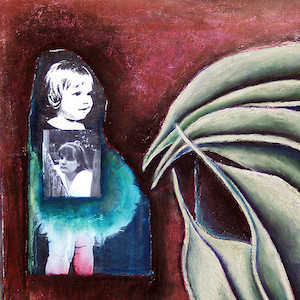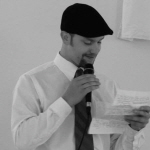Naming

They say there’s a history of mental illness in my family, but I didn’t grow up with the mentally ill—I grew up with crazy sons-of-bitches. That’s all they were, like the “depressed” kids at school were just whiners, or the suicidal drunks at Jimmy’s Tavern were just depressed. And that’s how we liked it.
Until my wife Laura dropped her terminology on the whole family during our boisterous Viking-style Christmas dinner in Grandma’s crammed dining room. Laura had turned into an amateur genetic detective in the three months she’d been pregnant, and she let her new-found jargon slip without a second thought, as though “mental illness” were the old stain on our living-room carpet none of us could scrub out, had endearingly let become part of the fibers. Conversation stopped and we could hear the children giggle and move food around their plates. My family never missed a beat or a first punch, but now they sat speechless, no argument to be made. I rushed Laura out to the porch mumbling some nonsense about fresh air and hormones. It’s alright, I told the group of shifting and rolling eyes before she came back in. It’s not you guys—it’s her. The normal tricks a pregnant body plays. She didn’t mean to offend. Please do not destroy my pregnant wife.
They all believed me. We let it go, and the stain was forgotten.
But I couldn’t forget. Afterward Laura told me how glad she was that I’m not some undiagnosed nutcase like my parents or my aunts and uncles and their many, many children. That I never went to jail for stealing a car or beating someone outside a bar. That I never joined a cult or some dangerous political movement. That I didn’t lose my savings to scams every few years, didn’t end abusive relationships in arson. But those problems jump around the genome, she added, skip generations, show up in ways no one can predict. I asked her what she wanted me to do about it and she rolled over and drifted off to sleep, but I stayed up, looking back at the family I thought I knew, at all the flaws I’d always assumed were just human, unique, unnamed. My relatives became case studies, their faults and maybe even their strengths no longer their own. So I counted the pills they might have prescribed, the lives they might have evened out, might have saved.
My Uncle Ken and his new wife Leah called the next day, invited me down to Jimmy’s for a few drinks and a game of pool. It had been awhile. When I arrived my Uncle John and his cousin Phil and Aunt La-La were throwing darts like knives. Aunt Sara and her son Tommy played the touch-screen game where you pointed out slight variations between the same pictures of naked women. Leah’s eight and ten-year-olds were scraping the tips of pool cues along the table felt, moving balls into pockets like dice on a craps table. Then there was a group of four or five cousins, their eyes glued to the baseball game, my father tending bar and Jimmy the owner, my distant uncle who had no family of his own, watching over it all with the same proud amusement my family often inspired.
They sat me down and fed me a beer and two different whiskey shots—Uncle Ken’s favorite and then my father’s. They asked me which I liked better, bickered about it for a while. Then they started in on Laura, on the baby we were having and how to raise a child in a world gone mad, or mentally ill, as that wife of mine might call it. You can’t treat ‘em like equals, Sammy, or they’ll try to raise themselves. No President ever grew up in daycare. Television and children’s books are both tools of the liberal media. Three words, Sammy—seen, not heard.
While they huddled around sharing the collective wisdom of our surname, a random depressed drunk scooted from stool to empty stool all the way down the bar toward us. None of the group noticed until he was practically peeking over Uncle John’s shoulder. “Why ya’ll even bother?” He held a fake smile with rotting teeth a few seconds too long, and my father’s fist clenched. “World’s too crazy for kiddies these days.” An empty bottle in a shaking hand appeared at his lip. “Sooner or later, some son-of-a-bitch’ll ruin ‘em. Not much ya’ll can do other than your best. But somethin’s gonna ruin ‘em. Always does.”
They all tensed up—John and Sara and my father and the cousins now drawn out of their ballgame. You could feel it between them, an instinctual form of communication, something my wife might call pheromones or a wolf-pack mentality. The lunatics about to defend the asylum.
But I stopped them again, like I had done for Laura, told them the drunk was just that—a drunk, not worth another fight, another arrest, another court hearing. Again they eased up at my request, but this time I regretted what I had done, my intrusion, my need to domesticate. Harsh words, bloody noses, calling out every offensive name in the book—these were the things we could all understand, all get behind, all agree upon afterwards. Us against them. Better than us against ourselves.
And so they returned their focus inward. Soon you and that wife of yours gonna need to protect that kid of yours from people like that. Can’t let them crazy sons-a-bitches run their mouths like you just did. Can’t let that kid run his mouth, Sammy, or that wife of yours either. Gotta be the man now, Uncle Ken added, and they all shook their heads and went back to the ballgame or the dartboard or their glasses, having made their point, and leaving me to mull it over.
But I wasn’t thinking about them anymore, as they talked on and got wasted and drove home one by one. And I wasn’t thinking about the drunk or about Laura, wasn’t thinking about the child waiting to be born, the first of many if she had her way, if everything seemed normal. I’m not sure I was even thinking of Vincent himself, my older brother, crazy son-of-a-bitch who’d literally flown from his motorcycle when we were still boys and tore down a chain fence we’d once climbed together. I was thinking of Vincent as a name, one of many Laura and I might consider for that first important decision, and how my own parents almost named my brother Sammy and me Vincent, and if we would have grown into each other’s lives if they had, how Sammy might be dead now, and Sammy the name I long to say again.
Then I thought about my son growing up without a name, how he might grow into something all his own until the world catches on and tries to sum him up in a word.










